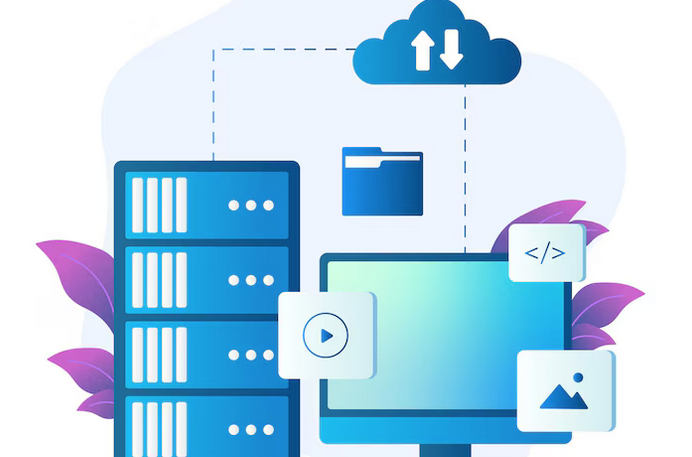For small businesses, the repercussions of data loss can be profound, with the severity of impact varying by the nature of the event and the industry in question. It’s important to remember that retrieving lost data isn’t always possible. This is why backups are critical.
Beyond the direct costs, other significant consequences await, such as legal repercussions from data mishandling, violations of compliance standards, and the erosion of customer trust. The stark reality is that approximately 80% of businesses don’t bounce back from major data loss or breaches.
It’s not up for debate—backing up your business data is essential. This includes safeguarding the information on each of your company’s computers and servers. While it’s best to back up everything, prioritizing data that’s crucial to your day-to-day operations is key. Modern cloud backup solutions typically offer the most comprehensive protection.
Our aim is to shed light on the importance and methodologies of backing up your entire digital ecosystem. This includes not only your data but also your network configurations and application settings, all to circumvent the very tangible threat of data loss that could jeopardize your entire business.
Key Reason to Implement Data Backups
The essence of data backup is akin to an insurance policy for your digital assets; it’s not about the backup itself, but what it represents—security and resilience. No one anticipates a fire ravaging their office space or their networks falling prey to cybercriminals, yet such calamities are not reserved for others; they can happen to any business, anytime.
Being prepared for these risks is not just about diligence—it’s a necessity. Consider backups as your plan for continuity and recovery, allowing you to respond confidently and effectively to incidents such as:
1. Disaster Recovery
Disasters can be unpredictable and vary in form, from natural calamities such as floods and earthquakes to man-made crises including cyberattacks and inadvertent data deletions. The common thread in these events is their potential to disrupt business operations severely. By establishing a robust backup system, your company equips itself with a rapid response mechanism to recover critical data swiftly. This proactive measure is crucial in minimizing downtime, preserving the continuity of business operations, and ensuring that even in the face of adversity, your business remains resilient with minimal disruption.
2. Ransomware
Ransomware has become a stark reality in the digital age, with incidents soaring by over 95% in 2022 alone. Currently, it’s estimated that a staggering 72% of businesses globally have been impacted by these malicious attacks. Ransomware is a type of malware designed to hijack your access to computer systems and data, demanding a ransom to unlock them. This trend is increasingly alarming, especially for small to medium-sized businesses (SMBs), which often have limited defenses against such sophisticated cyber threats and may struggle with recovery post-attack.
For companies like those at Cynxt, where resources for cybersecurity and incident response might be constrained, regular data backups are not just a safety measure—they are a critical lifeline. Backups can mitigate the damage by ensuring that businesses can restore their data and maintain operations without giving in to the demands of cyber extortionists.
3. Equipment Failures
Equipment failures pose a common yet frequently underestimated risk to company data. Incidents such as the sudden crash of a hard drive or the complete breakdown of a server are not rare, with hardware often succumbing to wear and tear, manufacturing defects, or power surges. When such equipment fails, the data stored within can become inaccessible or be lost entirely. This loss can interrupt productivity and lead to significant financial consequences.
To counteract these risks, regular backups serve as a critical insurance policy. They ensure that, even if the physical devices in your infrastructure fail, your data remains secure and recoverable. This proactive measure protects your operations from technological setbacks, maintaining the security, accessibility, and readiness of your business data for restoration. This ensures your business operations can proceed smoothly, even in the face of hardware failures.
4. Competitive Advantage
Data is a critical asset that can provide insights into market trends, customer behavior, and operational efficiencies. Losing this data can mean losing months or even years of insights that could drive strategic decisions. By securing your data through regular backups, you ensure that your business retains its competitive edge, leveraging historical data for analytics, forecasting, and strategic planning.
5. Regulatory Compliance
Many industries are subject to regulations that require businesses to maintain and protect certain types of data. Regulations such as HIPAA in the healthcare sector in the United States, GDPR in Europe, and many others mandate strict data protection and privacy measures. Regular backups are often part of these requirements, ensuring that data can be recovered and secured in accordance with legal obligations.
6. Human Error
Human error is an inevitable aspect of daily operations and, as highlighted by data backup service provider Carbonite, it ranks as the leading cause of data loss. Simple slip-ups, like falling for a phishing scam, can set off a domino effect, potentially unleashing viruses or triggering ransomware attacks. More commonly, data loss occurs through accidental deletions or the misplacement of devices containing valuable information. In the face of such vulnerabilities, implementing a robust backup strategy is more than just a precaution—it’s a necessary defense. By maintaining up-to-date backups, businesses can swiftly recover from these blunders, ensuring that no accidental keystroke leads to permanent data loss or significant operational setbacks.
What Data Should You Backup?
At first glance, the answer might seem like “everything.” And while it’s true that safeguarding all your data is ideal, what’s essential is to secure copies of data that are vital for your business operations. The process of identifying this data typically stems from a well-thought-out disaster recovery plan, one that preempts the most common data loss scenarios. (And don’t worry—if figuring out this plan seems daunting, we’re here to guide you through it.)
The complexity of data backup can increase depending on the type of data your business handles. For example, if your operations involve managing sensitive financial or medical records, you’re navigating the intricate web of data protection and privacy laws. It’s crucial to ask yourself: Are your backup procedures compliant with legal standards? Remember, it’s not just about having backups; it’s about backing up responsibly.
Different Backup Methods to Consider
n the past, backing up your data often meant relying on physical, removable media like tapes or disks—a method that’s now largely outdated. These traditional forms of backups are not only prone to security issues but also suffer from unreliability and the inevitable degradation of the storage media over time. Does your business still employ these old-school methods? It might be time for an upgrade.
Today’s industry standard leans heavily on cloud computing for data backup, providing enhanced security, scalability, and accessibility. However, that doesn’t mean onsite backups have lost all their value. On the contrary, secure onsite options remain in use and can be particularly fast and accessible for immediate recovery needs.
Many businesses now opt for a layered approach, integrating both cloud and onsite backups to create a redundant, fail-safe system. This redundancy is particularly powerful when backups are set to run automatically, simplifying the process and minimizing the risk of human error. By adopting a hybrid backup strategy that combines cloud, onsite, and even offsite backups, you enhance your data’s defense against a wide range of potential threats.
Each backup method indeed presents its own set of trade-offs in terms of cost, speed, and security. However, blending these methods offers a comprehensive backup solution that not only secures your data but also ensures it is quickly recoverable under various circumstances. A critical yet often neglected aspect of any backup strategy is regular testing. By consistently ensuring that your backups are operating as intended, you establish a reliable and strong safety net for your business, ready for when you need it the most.
1. Onsite Backups
This involves storing your backups at the same location as your primary data. Onsite backups are typically quicker to create and restore because they’re directly accessible within your local network. They often involve external hard drives, NAS (Network-Attached Storage), or servers. The downside? If a disaster strikes your main location, your backups could be compromised along with your primary data.
2. Offsite Backups
As the name suggests, offsite backups are stored at a different location than your main business premises. This could mean tape backups that are physically transported to a secure location or backups to a dedicated remote server. Offsite backups provide an extra layer of security in case of a local disaster but can be more cumbersome and slower to update and restore compared to onsite backups.
3. Cloud Backups
Cloud backups are a popular and modern solution that involves sending your data over the internet to be stored in remote, distributed servers managed by a third-party service provider. The beauty of cloud backups is their scalability, ease of access from any location, and the reduced need for physical storage space. They also offer a high level of redundancy, as cloud providers typically keep multiple copies of your data across various data centers. However, cloud backups rely on internet connectivity and can be slower to restore large amounts of data compared to local backups.
4. Hybrid Backups
A hybrid backup strategy combines onsite, offsite, and cloud backup methods. For instance, you might keep a real-time backup onsite for quick recovery, an encrypted backup offsite for disaster recovery, and use cloud backups for incremental changes to your data. This approach can provide a balance between fast access, security, and comprehensive protection against data loss.
Choosing the Ideal Backup Solution
Selecting the perfect backup solution for your business involves finding a balance between security, reliability, and ease of use. Cloud backups stand out in these areas, offering robust protection, high availability, and the convenience of automation, outpacing traditional physical drive or server backups that you manage on-site.
Budget constraints are a reality for many businesses, and they can influence decisions about which data to back up and how. That’s precisely where the expertise of a seasoned IT firm becomes invaluable. Partnering with an IT specialist can help navigate these financial considerations by tailoring a backup strategy that aligns with your financial and data protection needs.
Moreover, delegating the responsibility of data backups to an IT partner not only alleviates the burden from your shoulders but can also be more cost-effective in the long run. Managed service plans often end up being more economical than in-house efforts, especially when you factor in the potential costs associated with data loss. Your IT partner is there to ensure your data backup process is as seamless and effective as possible, offering peace of mind and freeing you to focus on your core business activities.
Do you need help with your IT? Cynxt can help! We provide IT Solutions that will provide you a peace of mind. Contact Us today or call (256) 456-5858 to schedule an appointment. We are located at the Shoals Business Incubator in Florence, AL. Let us help you keep your digital life running smoothly!
Cynxt Service Areas:
We service the following areas and the surrounding cities. Click here to see the full list of cities we services. We can support your business anywhere Remotely.
North Alabama:
- Florence
- Athens
- Decatur
- Huntsville
Middle Tennessee:
- Franklin
- Columbia
- Lawrenceburg
- Pulaski
About Us:
Cynxt IT Services, with over 17 years of IT experience, provides enterprise-level solutions and skilled support to small and medium businesses. As a reliable MSP IT Partner, we are committed to supporting the growth of your business.
Services:
We offer a variety of IT services. You can learn more about Our IT Services. Not seeing a service that you need? Contact Us and let’s discuss your needs.
- Managed IT Services
- Hourly IT Support
- Cybersecurity
- Cloud Services
- Networking
- Network Cabling
- IT Consulting





